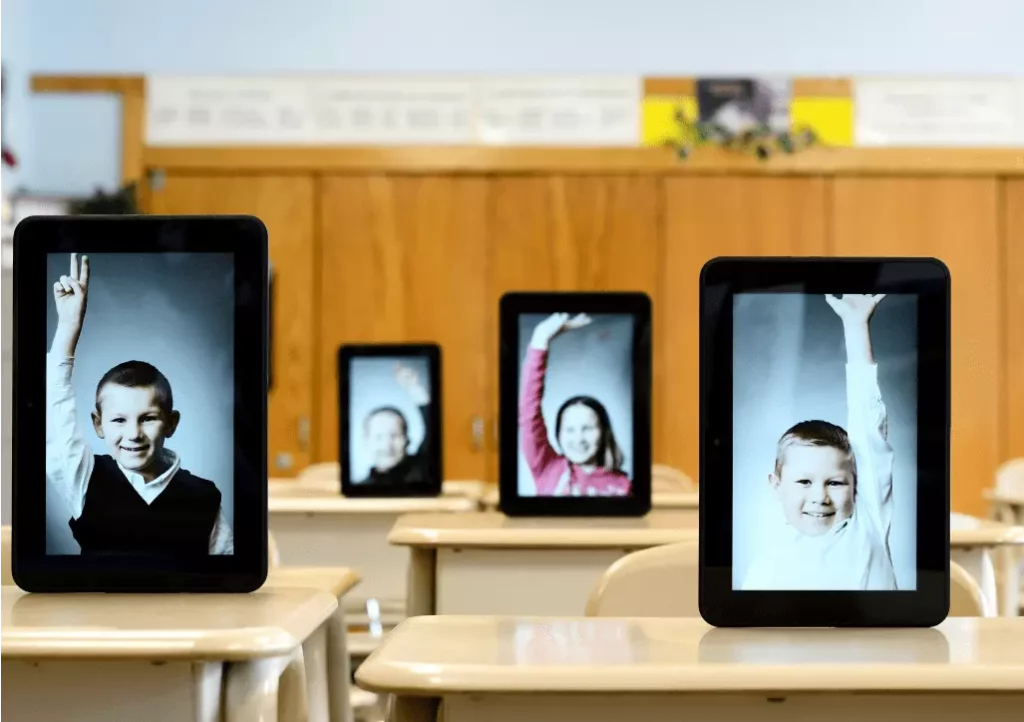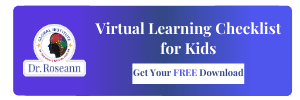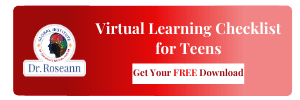How has Remote Learning Impacted Kids?
What is the effect of virtual learning on kids? How is virtual learning affecting students? What is Zoom’s toll on a kid's mental health? Well, those are the questions that we are asking.
Remote learning has impacted children of all ages across the country in different ways. For some children, remote learning has been an easy transition and they have benefited from learning at their own pace while at home. The majority of children, however, are really struggling with remote learning and specifically with attention, motivation, and processing.
The lack of structure in their day to day life from not being in the classroom everyday (or at all), limited peer interactions, a reduction in movement and athletic activities, and “Zoom fatigue” is wearing on kids and their parents. Kids are missing out on classical in-person instruction and those all important interactions with teachers and peers. In addition, parents are naturally overwhelmed and stressed out due to that and that is impacting their children too.
Are you looking for ways to improve the virtual learning of your child or teen? Then download my checklists to see what you need to do to improve your child’s attention and learning.
How is Virtual Learning Impacting Elementary Students?
With younger children, the success of virtual learning is highly dependent on parent support, teacher instruction, and accessibility of technology and the internet. For very young children, they simply aren’t going to learn independently and need a caregiver to engage them in the virtual platform. For some parents, they have been able to manage their child’s learning successfully and for others, it has been extraordinarily hard. Most parents aren’t trained educators and naturally struggle with helping their children engage and learn. Moreover, parents are spread thin trying to teach their children while working remotely too, which is going to impact the quality of young children’s education.
How is Virtual Learning impacting the Academics of Teens?
For older kids that have good attention and are organized, they are navigating their way through the day to day of virtual learning. Older kids are loving the extra time they get in the morning to sleep in but other than that, they are desperate to be with their friends and actually miss school. Independent learning without a lot of teacher instruction has been hard on kids of all ages and for older kids, high school is all about preparing for college. Teens, parents, and teachers alike are concerned about what this disrupted educational period will mean and realize that we should assume that teens will be missing some foundational skills.
How is Virtual Learning Socially Impacting Kids?
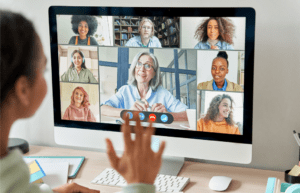
On the social front, kids of all ages are missing out on the day to day exchanges with their peers and of course spending time with their friends. Adolescents have especially been impacted by the loss of autonomous social interactions because developmentally, this is a time when kids are moving toward spending more time with friends. The loss of time with friends is a major factor in an uptick in stress, depression, anxiety, and other mental health issues.
How is Virtual Learning Impacting The Mental Health of Children and Teens?
The pandemic and all that stress, uncertainty, and overwhelm 2020 brought with it, has impacted the emotional wellbeing of children and teens. Even though kids are resilient, there have been a lot of “punches” in 2020 with a continual stream of disappointments. The good news is that when parents role model good stress coping skills and resilience, children can gain those same skills from us and manage these disappointments in a healthy way.
In my blog, How the Pandemic Impacts Children’s Mental Health, I go into depth about the impact of the pandemic on children’s mental health and what are the risk factors and protective factors for children’s mental health. To learn more about stress and how to help your child build coping skills, read my blog, How does stress affect your child
What are the Benefits of Virtual Learning for Kids?
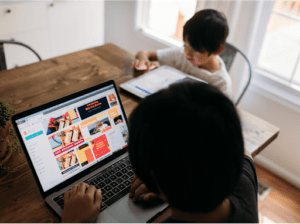
One silver lining from this pandemic is that for many families, the stress of 2020 has made them reflect and recalibrate to prioritize health. For some families that means focusing on foods and activities that reduce stress and improve brain health and for others it means that they are cutting back on stressors in their lives. When we focus on wellness, we not only get immediate benefits, but our children gain the tools to care for themselves today and in the future. A small segment of families have embraced their home learning experience because their children are thriving and have decided to homeschool their children indefinitely. Every child learns differently and homeschooling is a great option for a family that feels confident about educating their child and have adjusted their lifestyle to accommodate.
What is the Long-Term Impact of Virtual Learning on Kids?
In general, kids are resilient and most children will bounce back after this extended pandemic, especially when their parents are doing their best to put their own oxygen mask on and role modeling healthy coping skills. Taking time to connect with kids and being present, as well as validating feelings are critical in helping kids navigate these trying times.
In my blog, How the Pandemic Impacts Children’s Mental Health, I look out what risk factors and protective factors are associated with mental health and how these factors tie to the long-term mental and wellness of our children.
How Can Parents Help with Virtual Learning?
Parents can help their children and teens with virtual learning, through structure and routine. These aren’t easy times but when we do our best to coordinate our own work with our child’s learning, everyone can feel good about their child’s education.
It is super important to get kids and families moving to counter that virtual learning fatigue. Movement helps attention through increased oxygen to the brain and increased feel good neurotransmitters in the brain plus it improves posture and helps the body do its work too.
Are you feeling overwhelmed and not sure what to do next? Then join us for the FREE Get Unstuck Parenting Summit to find out how to help your child with virtual learning where we dive into ways to counter technology drain and set limits around technology. You can learn more about this parenting summit in my blog or you can just sign up for the FREE Get Unstuck Parenting Summit.
Are you looking for help for your child’s or teen’s behavior?
Boy, the world is stressful right now (and it has been for a long time!). Of course, you are worried about your child’s mental health! Your child may be struggling with focus, stress, mood, behavior, emotions, or socially and you aren’t sure what to do about it and you feel STUCK… Well, Dr. Roseann is here to show you how to GET UNSTUCK!
As a licensed therapist and certified psychologist, as well as a special needs mom herself, Dr. Roseann knows what it is like to search for ways to help your child’s attention, learning, and behavior and still see your child struggle. So, if you’ve gone down the Google MD and ineffective medication and therapy rabbit hole, it is time to get support from Dr. Ro who can help you help your child to be focused, calm, and feel good about themselves.
Want to work with Dr. Roseann, so you can turn your child’s behavior around and GET UNSTUCK?
Sign up for the FREE Get Unstuck Parenting Summit, where you get access to amazing speakers and parenting resources. You can get her books for parents and professionals, including: It’s Gonna Be OK™: Proven Ways to Reverse Your Child’s Mental Health Issues With Natural Therapies, Teletherapy Toolkit™ and Brain Under Attack: A Resource For Parents and Caregivers of Children With PANS, PANDAS, and Autoimmune Encephalopathy.
Want to work with Dr. Roseann personally? She sees people at her Ridgefield, CT center using neurofeedback, biofeedback, and psychotherapy to turn behavior around, as well as does neurofeedback and coaching remotely. She also does small group special needs parent coaching though her Get Unstuck Program™, where Dr. Ro walks parents through how to reduce and reverse mental health issues to break free from those barriers that are holding your child and family back so they can be calm, making connections, and getting good grades. She has also reached billions through her dozens of media appearances on her mission to, ‘Change the way we view and treat children’s mental health™.”
The best way to find out if we can help you is to apply to work with us, so we know you are ready for the powerful change that lies ahead.
Always remember… “Calm Brain, Happy Family™”
Are you looking for SOLUTIONS for your struggling child or teen?
Dr. Roseann and her team are all about solutions, so you are in the right place!
There are 3 ways to work with Dr. Roseann:
You can get her books for parents and professionals, including: It’s Gonna Be OK™: Proven Ways to Improve Your Child’s Mental Health, Teletherapy Toolkit™ and Brain Under Attack: A Resource For Parents and Caregivers of Children With PANS, PANDAS, and Autoimmune Encephalopathy.
If you are a business or organization that needs proactive guidance to support employee mental health or an organization looking for a brand representative, check out Dr. Roseann’s media page and professional speaking page to see how we can work together.
Dr. Roseann is a Children’s Mental Health Expert and Therapist who has been featured in/on hundreds of media outlets including, CBS, NBC, FOX News, PIX11 NYC, The New York Times, The Washington Post,, Business Insider, USA Today, CNET, Marth Stewart, and PARENTS. FORBES called her, “A thought leader in children’s mental health.”

She is the founder and director of The Global Institute of Children’s Mental Health and Dr. Roseann Capanna-Hodge. Dr. Roseann is a Board Certified Neurofeedback (BCN) Practitioner, a Board Member of the Northeast Region Biofeedback Society (NRBS), Certified Integrative Medicine Mental Health Provider (CMHIMP) and an Amen Clinic Certified Brain Health Coach. She is also a member of The International Lyme Disease and Associated Disease Society (ILADS), The American Psychological Association (APA), Anxiety and Depression Association of America (ADAA) National Association of School Psychologists (NASP), International OCD Foundation (IOCDF) International Society for Neurofeedback and Research (ISNR) and The Association of Applied Psychophysiology and Biofeedback (AAPB).
© Roseann-Capanna-Hodge, LLC 2023
Disclaimer: This article is not intended to give health advice and it is recommended to consult with a physician before beginning any new wellness regime. *The effectiveness of diagnosis and treatment vary by patient and condition. Dr. Roseann Capanna-Hodge, LLC does not guarantee certain results.

